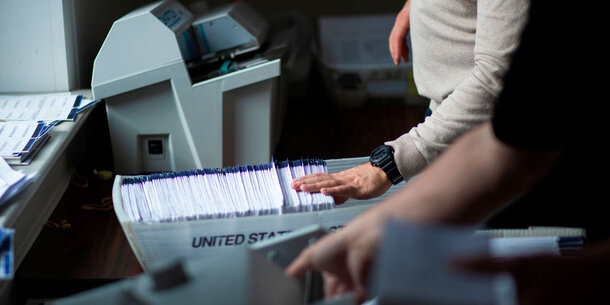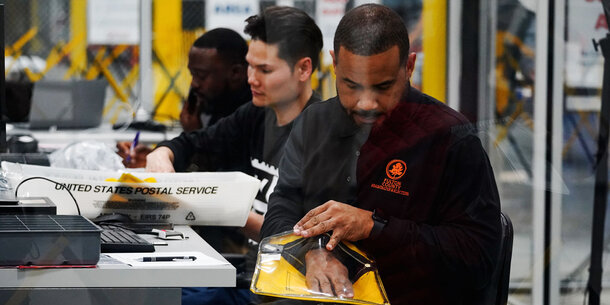Since May, the Justice Department has demanded that nearly every state and Washington, DC, hand over election-related records and data, such as full copies of statewide voter registration lists and ballots from previous elections, as well as access to voting equipment. The federal government has sued more than 20 states and Washington, DC, for not complying.
The requests cover sensitive, private information such as driver’s license numbers and partial Social Security numbers. Its collection by the federal government raises serious privacy and security concerns and may violate state and federal laws.
These demands by the Trump administration are unprecedented and a clear encroachment on states’ power to run elections as outlined in the Constitution. The effort is part of the administration’s concerted campaign to interfere with future elections.
Demands for Statewide Voter Registration Lists
At least 47 states and Washington, DC, have received requests for their complete voter registration lists. Most states have provided a publicly available version (which does not include Social Security numbers and driver’s license numbers) or have not provided the voter registration lists at all. The DOJ has sued Washington, DC, and 24 states for refusing to provide their statewide voter registration lists with driver’s license and Social Security numbers: Arizona, California, Colorado, Connecticut, Delaware, Georgia, Hawai’i, Illinois, Maine, Maryland, Massachusetts, Michigan, Minnesota, Nevada, New Hampshire, New Mexico, New York, Oregon, Pennsylvania, Rhode Island, Vermont, Virginia, Wisconsin, and Washington. The cases in California, Michigan, and Oregon have been dismissed.
At least 11 states have either provided or said they will provide their full statewide voter registration lists, including driver’s license and Social Security numbers: Alaska, Arkansas, Indiana, Kansas, Louisiana, Mississippi, Nebraska, South Dakota, Tennessee, Texas, and Wyoming. The DOJ has asked states to agree to a “confidential memorandum of understanding” in connection with handing over their full voter files. That agreement reveals both the DOJ’s plans to interfere with the states’ authority to run elections and how dangerously insecure the sensitive data will be in the department’s hands. Alaska and Texas signed the agreement when they gave their full voter files to the DOJ. Mississippi, South Dakota, and Tennessee refused to sign the agreement when they provided their voter rolls.
Chief election officials from 10 states sought clarification from the DOJ and Department of Homeland Security in November on how the statewide voter registration lists will be used: Arizona, California, Colorado, Maine, Minnesota, Nevada, New Mexico, Oregon, Vermont, and Washington. A DHS official told state election officials that it had neither received nor requested any voter data from the DOJ. However, the Trump administration then released a statement asserting that the DOJ was sharing the voter registration data it collects with DHS.
Demands for Other Election Records or Access to Equipment
The DOJ has made other demands for election records or access to voting equipment.
An intermediary who claims to work for the Trump administration sought access to voting equipment in Colorado. In Missouri, a DOJ official requested access to voting machines in two counties. In Minnesota, the DOJ requested all records relating to same-day voter registration. Officials in Colorado, Missouri, and Minnesota refused all of these requests.
The DOJ has sued Fulton County, Georgia, over its refusal to produce records related to the 2020 election. On January 28, 2026, the FBI executed a search warrant for records related to the 2020 election at the Fulton County Election Hub and Operation Center.
The Brennan Center is tracking all of these requests, states’ responses, and lawsuits. The map below shows which states have been contacted based on public reporting and public records requests made by the Brennan Center, and which states have been sued. Summaries of the correspondences are also included. Click on a state to see what’s happened in the state.




